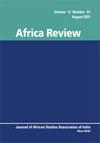评估经济政策对突尼斯人权的影响-联合国特派团的经验教训
IF 0.5
Q4 AREA STUDIES
引用次数: 1
摘要
本文以2017年联合国对突尼斯的一次访问为基础,研究了该国经济与人权,特别是经济和社会权利之间的联系。它涉及以下两个问题:经济和财政困难以及所执行的有关政策如何影响突尼斯的人权?该国的腐败、非法资金流动和人权在多大程度上相互关联?案文介绍了突尼斯最相关的国际人权标准和承诺,以及突尼斯关于人权和经济政策的国家人权框架。它还介绍了该国面临的财政、经济和政治挑战,以及政府通过经济改革方案作出的反应。报告还讨论了为解决腐败和非法资金流动所作的努力,包括在国内外追回资产、打击非法资金流动和腐败的体制能力、建立问责制和遏制有罪不罚现象、真相与尊严委员会、关于行政领域和解的组织法和银行部门问责制。文章的结论是,虽然承认民主政府仍在努力应对本·阿里政权留下的经济遗产,但正在实施的经济改革(如紧缩和调整)需要采取全面的人权方法,以确保这些改革更有效地促进这些权利。报告还得出结论说,腐败仍然是突尼斯的一股不稳定力量,影响了突尼斯的经济,破坏了该国人权的享受。最后,提出了供讨论的政策建议。本文章由计算机程序翻译,如有差异,请以英文原文为准。
Assessing economic policies impact on human rights in Tunisia – lessons from a United Nations mission
ABSTRACT Based on a United Nations mission the author conducted to Tunisia in 2017, this article studies the links between economy and human – in particular economic and social- rights in this country. It addresses the following two questions: how do the economic and financial difficulties and related policies implemented affect human rights in Tunisia? To what extent are corruption, illicit financial flows and human rights interlinked in the country? The text presents the most relevant international human rights standards and commitments of Tunisia as well as its national human rights framework concerning human rights and economic policies. It also presents the financial, economic and political challenges that the country faces and the government responses through economic reform programme. It also discusses the efforts made to address corruption and illicit financial flows, including asset recovery at home and abroad, the institutional capacity to fight illicit financial flows and corruption, establishing accountability and curbing impunity, the Truth and Dignity Commission, the organic law on reconciliation in the administrative field and accountability in the banking sector. The article concludes that, while acknowledging that the democratic government is still making efforts to cope with the economic legacy left by the Ben Ali’s regime, the economic reforms (such as austerity and adjustment) being implemented need to adopt a holistic human rights approach in order to ensure those reforms promote these rights more effectively. It also concludes that corruption continues to be a destabilizing force in Tunisia, infecting its economy and undermining the enjoyment of human rights in the country. Towards the end policy recommendations for discussion are presented.
求助全文
通过发布文献求助,成功后即可免费获取论文全文。
去求助
来源期刊

Africa Review
AREA STUDIES-
CiteScore
1.80
自引率
12.50%
发文量
22
期刊介绍:
Africa Review is an interdisciplinary academic journal of the African Studies Association of India (ASA India) and focuses on theoretical, historical, literary and developmental enquiries related to African affairs. The central aim of the journal is to promote a scholarly understanding of developments and change in Africa, publishing both original scholarship on developments in individual countries as well as comparative analyses examining the wider region. The journal serves the full spectrum of social science disciplinary communities, including anthropology, archaeology, history, law, sociology, demography, development studies, economics, education, gender studies, industrial relations, literature, politics and urban studies.
 求助内容:
求助内容: 应助结果提醒方式:
应助结果提醒方式:


